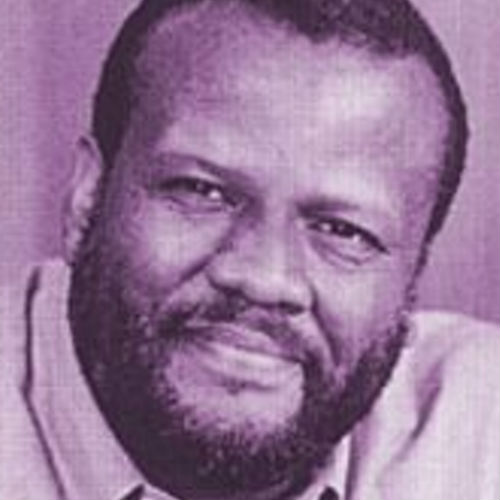Visiting Poets
Forrest Hamer
Forrest Hamer’s first book, Call and Response, winner of the Beatrice Hawley Award for Alice James Books, was published in 1995 and praised for its beauty and delicate truth. A psychologist as well as a poet, his poems are finely wrought tapestries. The Hudson Review called Hamer remarkable for his ability to find the universal in his own experiences with “seeming casualness and ease, and yet [the work] deftly opens deep and complex issues of identity — identity explored in the dimensions of race, family, generation, sex, psychology, and religion.”
Yusef Komunyakaa has lauded Hamer’s ability to translate “everyday feelings” for all of us: “Southern, American, universal—the voices cohere into a seamless, symphonic bravo for human endurance.” Mark Doty writes that Hamer courageously stands “in the middle of a stream of family and history.” This stream, the masterful technique and flow of his words, showcases a talent both broad and deep, a distance so immense it is yet to be fully measured, one “that marks what I am and what/ you are or life is or I am not of— / I have been keeping these distances” (“Sculpture”).
Partially deaf, Hamer has attuned himself to listen exquisitely, with subterranean depth, to his own voice and others’, and to recount their stories with quiet power. “Becoming a poet,” he once remarked, “was my version of becoming a preacher. The opportunity to in some way lead the call—to engage people literally in a back and forth between speaker and audience, between preacher and congregation—is also the opportunity to engage people in listening closely to an aspect of themselves that is attuned communally and is much more complex than seems at first true.”
Hamer’s poems have been published in the Beloit Poetry Journal, the Kenyon Review, and ZYZZYVA and other journals. “Getting Happy,” was chosen by Rita Dove for The Best American Poetry 1994. Hamer currently teaches literature at the University of California at Berkeley and maintains a practice in psychology in Oakland, California.
Select Poems
When the men got happy in church,
they shouted and jumped straight up.
But the women’s trances
made them dance with moaning; so,
I dreaded Rev. Johnson’s sermons
near their end, hated the trouble
he was causing inside
the souls of women sweating
and beginning to breathe fast.
One day, I worried, my mother
would let go and lose herself
to him, become as giddy
as when my father was coming home
on leave. Just as silly.
Yet, when it finally happened,
I felt only left behind.
Years later, another first time,
I heard my moan echo inside
a girl’s ear and recognized
how woeful pleasure feels.
I then began to wonder
if there weren’t some joy still
to give in to, make me shout
not as men do but as a woman.
It troubles me.
I do not have a woman’s body
but fear that moaning will betray
this want in me, or another
to be like a woman. Mostly,
I fear that moaning will uncover
the love for my mother that is still
so deep that I want little more
than to be with her as closely as I can.
From CALL AND RESPONSE (Farmington, 1995)
And the old man, supervising grown grandsons, nephews,
any man a boy given this chance of making
a new sidewalk outside the apartment building where
some of them live, three old men and their wives,
the aging unmarrying children and the child
who is a cousin, whose mother has sent her here
because she doesn’t know what to do with her,
she’s out of control, she wants to be a gangsta, and
the old folks talk to her as if she minds them
and already has that respect for their rears her mother
finally grew into. The girl who does not look
like them eats and eats and sleeps late, sneaks away
when they are busy, and tonight will write herself
all over the sidewalk while it is still wet but
the old have gone inside, and the grown gone home,
and her mother who is somewhere overseas thinks of
writing her that long long letter, but decides not to.
From The Massachusetts Review (Summer 1999)
an abnormal desire for unusual foods
I’d noticed the flowers first, wondered if
the orange I saw in the pink of them was
actual or an idea of mine,
something descriptive which had become real.
I still don’t know, but in his office
that morning we talked about how soil tastes.
The dirt nearest my grandmother’s hollyhocks was
the best. Shades of black smelled of stories
I hadn’t yet heard that would linger
in my nose through night – these would be places
to grow things, grow: lay inside some seed then each day
resurrect the forming curl and green of them.
Stories change things, even the dead things laid there.
So when my grandmother was buried,
and there could be no digging and redigging,
I imagined the darkness was changing her
night by night: her face sank while hairs raised themselves
like fur, her nails grew long and rounded, and
each dim wrinkle dried into another.
By the eightieth night, I noticed
that her skin had worn itself away, and how
her pink dress loosely framed her shape of bones.
And there were stories in the soil
about where she’s gone and the people I knew
only by name that she’d seen again. She
was learning other stories to tell me,
and she whispered them in my deepening sleep.
I had forgot the story about the night
the soil erased her and she was anything
but brightness in grains. But I was
sitting in his office one morning
complaining of no dreams, and the idea
of orange made those flowers smell dank,
and I became alive, craving.
From CALL AND RESPONSE (Farmington, 1995)

